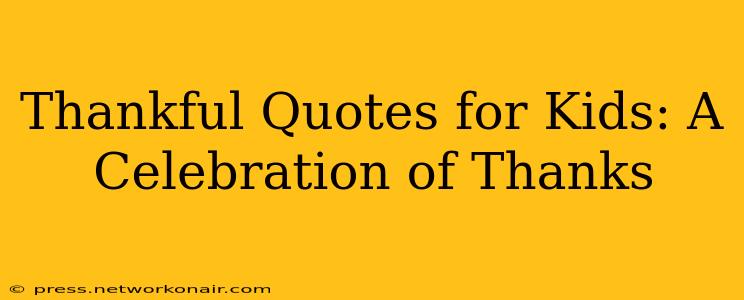Teaching children gratitude is a cornerstone of raising kind, compassionate, and well-adjusted individuals. A simple "thank you" goes a long way, but exploring the deeper meaning of thankfulness through quotes can significantly enhance their understanding and appreciation. This post delves into the power of thankful quotes for kids, offering a collection of inspiring sayings and exploring how to cultivate gratitude in young hearts.
Why are Thankful Quotes Important for Kids?
Instilling gratitude in children is more than just good manners; it's a powerful tool for emotional well-being. Studies show that grateful children tend to be happier, more resilient, and have stronger relationships. Thankful quotes offer a concise and memorable way to convey the essence of gratitude, making it accessible and relatable to young minds. They provide a starting point for conversations about what we appreciate in our lives, big and small.
A Collection of Thankful Quotes for Kids
Here's a curated list of quotes perfect for sharing with children, categorized for easier selection:
Simple & Sweet:
- "Thank you for being you." - Simple and emphasizes individuality.
- "Saying thank you makes the world a brighter place." - Highlights the positive impact of gratitude.
- "Gratitude is sunshine for the soul." - A beautiful metaphor for the feeling of thankfulness.
Focusing on Family & Friends:
- "Family is where life begins and love never ends." - A classic reminder of family's importance.
- "A friend is someone who knows all about you and still loves you." - Underlines the value of true friendship.
- "The best things in life are the people we love." - Emphasizes the importance of human connection.
Appreciating the Little Things:
- "Be thankful for what you have; you'll end up having more." - Instils a positive mindset towards abundance.
- "Even small things can make a big difference." - Promotes appreciation for even the smallest gestures.
- "Look for the good in every day." - Encourages a proactive search for positivity.
Inspirational & Reflective:
- "What we have is enough, and more than enough if we share." - Promotes sharing and contentment.
- "Thankfulness is the beginning of gratitude. Gratitude is happiness." - Outlines the progression from thankfulness to happiness.
- "The smallest act of kindness is worth more than the grandest intention." - Underscores the importance of action.
How to Use Thankful Quotes with Kids
- Daily Discussions: Start your day by reading a quote together and discussing its meaning. Ask open-ended questions like, "What does this quote make you think of?" or "How can we show gratitude today?"
- Visual Aids: Create a gratitude board or journal where you can write down or draw pictures representing things you are thankful for. Include the quotes as inspiration.
- Storytelling: Weave the quotes into bedtime stories or create your own stories that highlight the importance of thankfulness.
- Acts of Kindness: After discussing a quote, encourage children to perform a kind act based on its message.
What are some ways to teach kids gratitude?
This is a multifaceted question, and the answer goes beyond simply reciting quotes. Effective gratitude education involves:
- Modeling: Children learn by observing adults. Express your own gratitude openly and frequently.
- Journaling: Encourage daily journaling of things they are grateful for.
- Acts of Service: Volunteering or performing acts of kindness builds empathy and gratitude.
- Positive Affirmations: Start and end the day with positive statements focusing on appreciation.
What are some activities to practice thankfulness?
Several fun activities can help kids express gratitude:
- Gratitude Jar: Have everyone write down things they’re thankful for and put them in a jar. Read them aloud at the end of the week or month.
- Thank You Notes: Encourage children to write thank-you notes for gifts or acts of kindness.
- Gratitude Scavenger Hunt: Create a list of things to find that they’re thankful for (e.g., something blue, something soft).
By incorporating thankful quotes into daily routines and activities, parents and educators can effectively cultivate a deep appreciation for the good things in life, laying a solid foundation for emotional well-being and positive relationships in children. The consistent message embedded in these quotes, combined with practical applications, forms a powerful combination for raising grateful and happy children.

